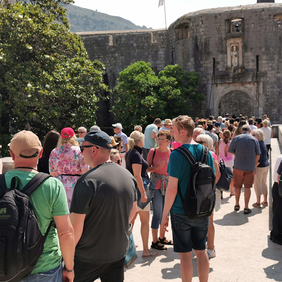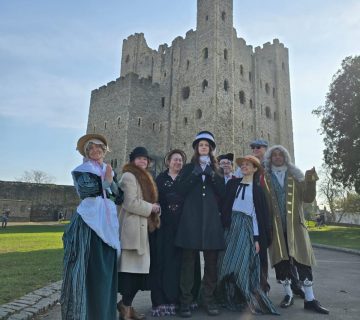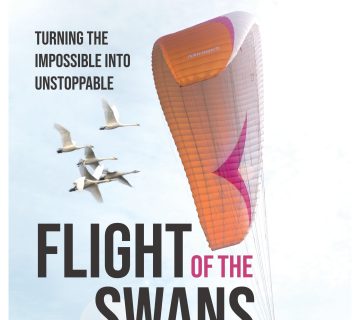
Visitors flooding Dubrovnik (Image: Ludwig)
When tourists experience heritage sites, their own experience is often rather shallow and might also have a negative impact on the site itself. Through this initiative, heritage should become more meaningful for tourists, and tourists should become more mindful towards heritage.
Many points that have been discussed during the previous initiative, ‘Fostering heritage communities’, will flow into the new endeavour, especially concerning:
- the role of local communities in co-creating heritage interpretation;
- the role of ‘the interpreter’ that should be more framed as a facilitator.
IE intends to align its initiative to the activities of those who have already been working for more sustainable tourism for a long time. We, therefore, started to liaise with European stakeholder organisations, including Europarc Federation, European Travel Commission and European Cultural Tourism Network, who all welcomed the initiative and assured their support.
Together with our coordinators and trainers, and especially with our Tourism Team, a concept paper has been developed which will now be turned into a small publication to be handed over to those who might be interested. This will also include some examples where IE courses triggered changes towards more mindful tourism development.
But what do we mean by transition hubs? We are basically searching for communities that:
- have notable heritage;
- are big enough (or have sufficient outreach) to implement IE courses;
- are not too big so that the focus would get lost;
- have an organisation for touristic development.
Furthermore, it would be an advantage if they already:
- have a profile linked to local heritage;
- are familiar with the storytelling approach;
- are already linked to an IE member through contacts with their stakeholders.
We should also liaise with tour operators, hotels, restaurants,… who proclaim that it is an advantage if visitors stay longer, experience deeper and reflect upon their experiences, and who could imagine to organise IE courses for their own staff and the staff of others.
We would like to offer two levels of engagement:
- Becoming organising partners and organise an IE course
Partners can use the label of IE organising partner for the particular year. - Becoming IE members and official partners of the initiative
Partners join IE as institutional or business members and based on an agreement stating that they promote the ideas of the initiative, they receive a declaration to be displayed on the wall for two years. Within this period, partners would be expected to organise an IE course and to develop their own case study that shows what impact this course had. Case studies that are available in October 2021 will be presented and published at the IE conference in Spain.
Regions that depend on heritage tourism and are now suffering from economic breakdown will be among the first regions to receive EU funding after the crisis. This might be especially true for rural regions. Most likely, funding will be linked to requirements that support the goals of the initiative. We intend to encourage local governments and public institutions to take advantage of this, to apply for such funding and also to become institutional members of our network. We count on our country teams to detect funding that is distributed through the nation states.
Please help us to search for potential transition hubs. If there is a country team in your country, inform your country coordinator. (Coordinators can be found at www.interpret-europe.net/contact). If this is not the case, please address office@interpret-europe.net.
Thorsten Ludwig is an IE Managing Director. He can be contacted at: thorsten.ludwig@interpret-europe.net.
To cite this article:
Ludwig, Thorsten (2020) ‘New IE initiative: Recreating tourism through heritage interpretation’. In Interpret Europe Newsletter 2-2020,14.
Available online: https://www.interpret-europe.net/fileadmin/Documents/publications/Newsletters/Newsletter_summer_2020.pdf




